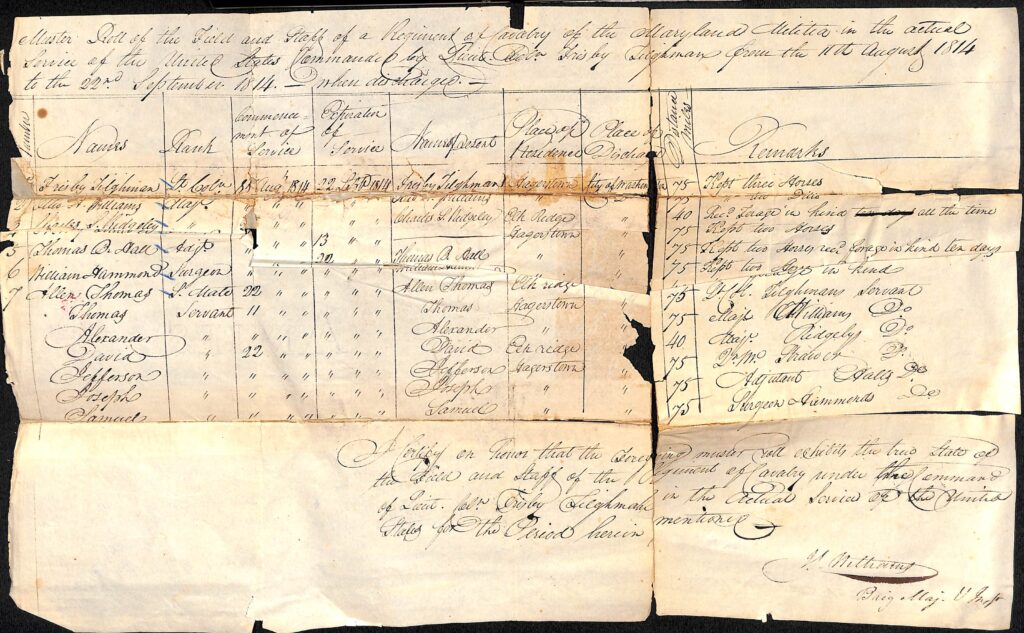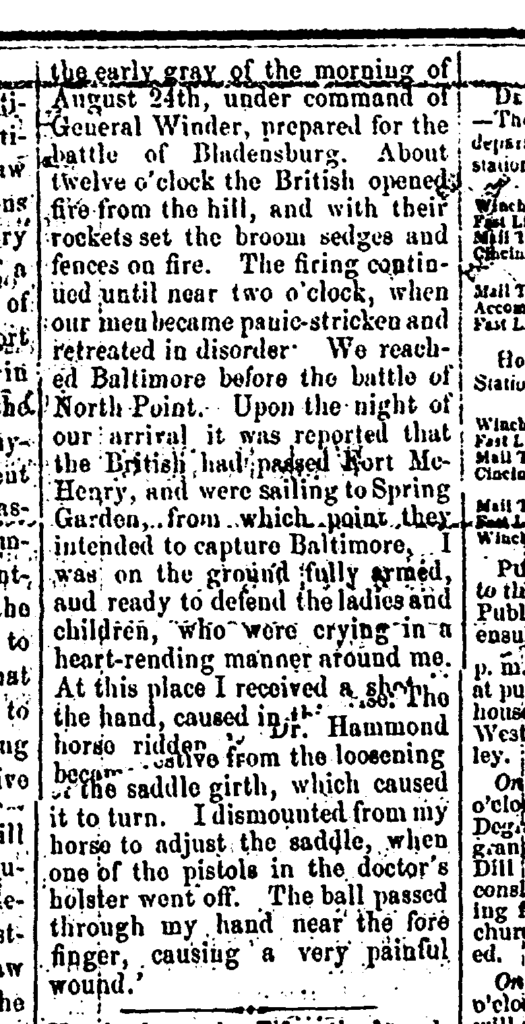SAMUEL NEALE
Samuel Neale, an African American veteran of the War of 1812 was born around 1795 in Hagerstown, Maryland. During the war, he was a steward and medical assistant to Dr. William Hammond, surgeon of the First Maryland Cavalry (Tilghman’s Cavalry) from Washington County, Maryland. It is unknown whether Samuel Neale was enslaved or a free man during the time of his service, however, in 1824 he purchased his enslaved son Joseph, age 5, from Frederick attorney and future United States Attorney General John Nelson. Thus, it is likely that Samuel or his wife, or both, were at one time enslaved.
While the United States Army prohibited all men of color from enlisting in the Army, the State of Maryland did not enact such an all-encompassing prohibition. However, due to gun laws at the time, men of color were restricted to non-combat positions. Often, in order to serve, these men volunteered as servants or stewards to local officers or doctors, and, by law, these positions were entitled to the pay of a private.
In 1870, Mr. Neale applied for and received a pension from the State of Maryland under an Act passed by the General Assembly “for allowing pensions to certain soldiers and widows of soldiers of the war of eighteen hundred and twelve.” Per this Act, Mr. Neale received an annual pension of eighty dollars, in four equal payments of twenty dollars each during his natural life, and to his widow after his death Mr. Neale was the only black American to receive such a pension.
Mr. Neale’s pension application, certified by Frederick County judges, was published by the Frederick Examiner on 2 February 1870, and provided a detailed description of his service, as well as the movements of his cavalry unit before, during and after the Battle of Gaithersburg and at the Battle of Baltimore. He stated that early in the summer of 1814, [he] accompanied Col. [Frisby} Tilghman’s regiment of cavalry from Washington County, as steward to Dr. Hammond and later as his aide. During the journey, Hammond’s aide was dismissed, and Neale was appointed surgeon’s aide in his place. “His duties were to attend the doctor on the battlefield, carry his case of surgical instruments and assist in the care of the wounded. He was armed and equipped as a soldier in order to fight the enemy when hard pressed”.
Mr. Neale describes his unit’s arrival at Benedict, Maryland, where they first “encountered the enemy”. They then shadowed the British troops to Marlboro, where a skirmish took place, and then were ordered to Bladensburg. After Bladensburg, his unit was ordered to Spring Garden in Baltimore to scout and reconnoiter the western approaches to the city. He described that, at one point, he was “on the ground, fully armed, and ready to defend the ladies and children, who were crying in a heart-rending manner around me.” Here, he was wounded in the hand when a pistol misfired.
The original muster roll of Tilghman’s Cavalry at the National Archives confirms Neale’s service beginning with the Federal activation of his unit on 11 August 1814 in Hagerstown, and discharged on 20 September 1814, at Baltimore.

After the war, Neale lived in the city of Frederick, Maryland, and worked variously as laborer and porter, allowing him to purchase property in 1822 for $500 on 3rd Street and Love Lane in this city. There, he was to live the remainder of his life. We know from the United States Census records that by 1830, Mr. Neale, identified as a “free mulatto”, was married, and had several children. He and his wife Eleanor Thompson eventually had eight children. Son Samuel, Jr., graduated from Avery College in Pittsburg, later becoming a professor at that college, a nationally recognized speaker, and active supporter of the Republican Party.
Samuel Neale died on June 15, 1872, in Frederick, Maryland and is buried in an unmarked grave in St. John’s Catholic Church in Frederick, Maryland. In his will, he left his house and property to his wife Nellie. His obituary in the Frederick Maryland Union newspaper described Mr. Neale as a “prominent and respectable colored man” who was “well known in this community and enjoyed the confidence and respect of all who knew him. He was an Old Defender, and served his country with fidelity during the War of 1812.”


